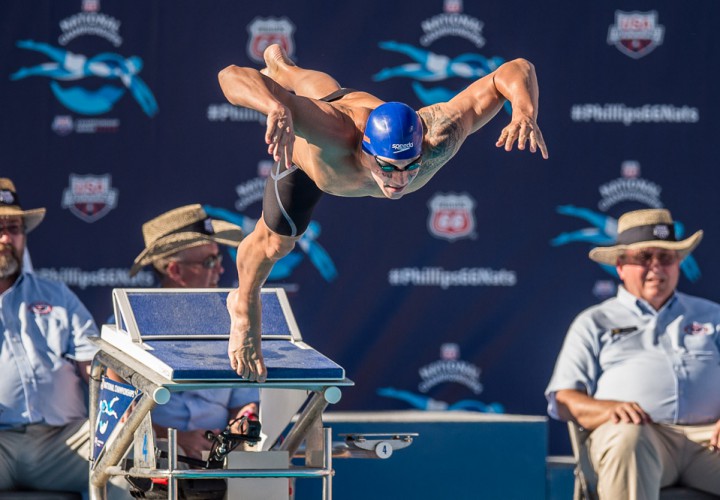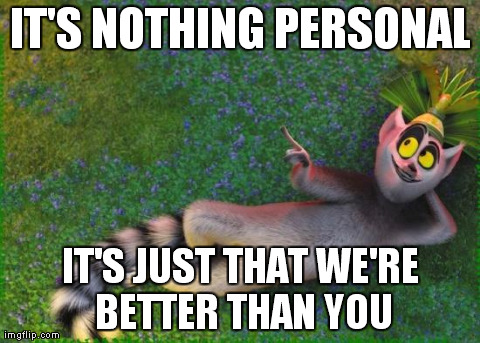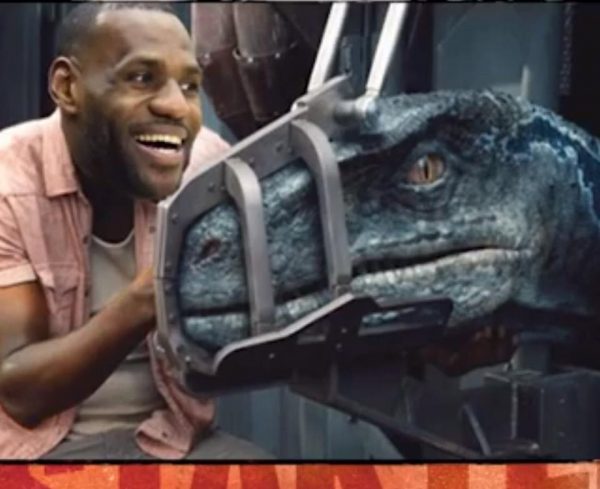
From Distance: Witnessing Evolution
2018-03-23
Four point play….
1. Caeleb Dressel just reminded every retired athlete that the new generation is far superior to theirs. Of course, most old heads won’t really bother to internalize that fact. They will go on and on about work ethic or grit, or any number of things that have nothing to do with numbers.
It’s much easier for an old timer to frame these conversations in a beneficial manner if stubborn things like “facts” are considered superfluous from the outset.
Fortunately, there are some sports that are simply unassailable. It doesn’t matter how great Jesse Owens was, it is a simple fact that Usain Bolt was faster. It forces an acceptable argument.
Who was the best sprinter of all time?
“Jesse Owens was the greatest of his era, but obviously Bolt has the record”.
Fine. I’ll take it.
In this era or any other, Caeleb Dresser is the fastest sprinter in swimming history.
I’d take him in a race against Tarzan any day. It was only in 2007 that the American record for the 50 yard short course freestyle broke 19 seconds.
It is the shortest race possible in the sport. Only 50 yards, not meters. The short course (25 yard pool x2) aspect tosses in another wall that must be hit and left perfectly. The technicality and pure explosion required are rarely approached in other sports.
And now, a little over a decade after the 19 second barrier was broken, Dressel left us all dumbfounded with a time of 17.63. That, my friends, is March Madness.
Almost every longer distance timed event is getting straight up destroyed by this generation. People simply don’t get tired in the same way they did before sports science helped to train these incredibly talented humans to maximize their potential.
The fact that short distance records are also going down is more an indication of a craft being perfected. Where exactly does my foot need to be placed on the starting block? Where part of my stroke am I slipping? Just how long should I hold the underwater streamline before breaking out?
These were questions that were asked in years gone by, but they had different answers then. Conventional wisdom evolves. The new times clearly show that current conventional wisdom, i.e., that some things need to be purely based on the bio-mechanics of an individual’s body, is getting closer to ideal.
2. In a team sport, there are more variables to consider. The more arbitrary a sport’s endgame, the more artfully people will attempt to reach said goal. Scoring one bucket might be a main goal in basketball, but it isn’t THE goal. It’s not the endgame. That, of course, is to have more points than the other team when the clock strikes zero.
How a team accomplishes that, within the rules of an era, drastically affects our adjudication of each individual player of that realm.
Some “Facts” why it was harder to dominate offensively in the 90s NBA.
- Playing one-on-one defense was easier when handchecking was allowed.
- The game was played at a slower pace, both on a possession to possession basis, and during a possession.
- Many dudes on the floor couldn’t shoot, wrecking spacing.
Some “Facts” why it was easier to dominate offensively in the 90s NBA.
- Playing team defense is harder without a legalized Zone D. In today’s game, it’s incredibly difficult to clear out and let a guy go one-on-one. He might not get handchecked, but he will have to go against a strongside loaded defense. In those days, the handcheck was all a dude could rely on.
- The game is played now at a higher pace, both numerically and energetically. Guys can’t risk taking nights off for fear of getting slammed on social media. In the 90s, people often took those nights.
- Everyone can shoot now, opening floor spacing, but eliminating the reliance on close range buckets. There were guys that feasted from the post that couldn’t get a shot off in today’s game against an overloaded strongside D.
There are players in this era that would have thrived in the 90s, and vice versa. But looking at any tape from that generation, my generation, clearly shows that fewer people on the basketball floor had the combination of skills, stamina, and strength that today’s players have.
Basketball is a far more complicated sport than any racing sport. However, it’s precisely that reason that we can use the 50 yard Freestyle as an example of just how much better people are at accomplishing athletic goals. With such a simple swimming goal, the very best somehow found a way to shave off more than a second from the shortest race possible.
With a more complicated goal, there are far more avenues to success. There are more minutiae to perfect. The more variables, the more room for improvement. A sport will evolve through those improvements.
3. Speaking of evolution, there has been a lot of buzz about the Portland Trailblazers evolution as a team. Favorite, Zach Lowe, posted a great piece going into the intricacies of the Blazers’ improved regular season play.
Lowe hits all the points, but I still think people are focusing too much on the great play of Damian Lillard over this stretch.
Now before you accuse me of hating on Lillard in an homage to my past, let me offer this moment of contrition. Dame has been fantastic this season. His defense went from being my go-to target of all that is wrong in basketball evaluation to something approaching “fine”. A team defense can’t be top five all season with a complete train wreck at the one guard. He’s held his own on that end for the first time in his career.
Still, this is the real reason the Blazers are balling out.
“Maurice Harkless, Al-Farouq-Aminu and Evan Turner — yes, Evan Turner — are feasting on drive-and-kick 3s. Aminu, long the team’s bellwether, is up to 40 percent from deep. Turner is 24-of-60 since mid-December. Harkless has been even hotter.”
-Lowe
Watching the Rockets beat the Blazers the other day felt like watching two brothers beat each other up. They aren’t quite twins, but they look so darn alike, people frequently get the wrong idea.
The backcourt comparison is obvious, but the thing that made me laugh was watching Al-Farouq Aminu and Maurice Harkless go against Luc Mbah a Moute and Trevor Ariza. Are there four players that look and play more alike than that quartet?
Sure, Ariza has been featured more at times during his career, and Harkless is a bit more advanced as a post player, but other than that, those four guys feel like basketball clones.
Even P.J. Tucker guarding Jusuf Nurkic warranted a chuckle. They clearly have different positions and games, but they feel like kindred spirits in a lot of ways. They are both ridiculously strong guys who actually are lighter on their feet than they are given credit. Their defensive talents unlock lineup options that wouldn’t be possible without them. And they would be in Jalen Rose’s all-dark alley team (or whatever he called that group of NBA guys that you’d want to have your back in a brawl).
4. Listen, I love all those guys. The four clones are absolutely essential players defensively. The are fun role players who win games when they are hitting their open shots. Unfortunately for the Rockets and Blazers, they are also all inconsistent enough throughout their careers to easily torpedo a playoff series.
Every season, we reach this time of the year and the media decide that regular season basketball is similar enough to playoffs that we can extrapolate the season’s data to May and June. Maybe in the old days. The game has evolved.
In the regular season, the Rockets have either James Harden and/or Chris Paul on the floor at all times. Great. That means they don’t have a huge drop off when Harden hits the pine. The bench is propped up by an All-Star ball-handler in Paul.
In the playoffs, that doesn’t mean as much. All teams play their best guys more. The question is no longer “Paul versus backup PG”. It’s how well do Harden and Paul play together?
How does a defense shut down an offense with two great playmakers surrounded by wing defenders with questionable three ball accuracy?
The Rockets won’t beat the Warriors unless two of Durant, Curry, or Green are out with injury. The Warriors are too diverse on both ends to be beaten by a one trick pony.
A playoff defense can gameplan against an offense that is essentially ISO/PnR ball with shooters. Every year we see that happen. Chris Paul is an all-time great regular season player with limited postseason uptick.
Pro-Paul guys will point to some big numbers he has had in the playoffs. I’m not a pro-Paul guy. I think he maximizes his potential on a night to night basis. In the playoffs, it is easy to gameplan against his defensive limitations. It is true that he is a quick handed one-on-one defender and sturdier in the post than people think.
However, he has lost some athleticism and is only six foot. He’s legit small. In the playoffs, teams stop being lazy with the rock limiting Paul’s steals. A team hopes the Rocket’s switch happy defense will get Paul matched up against a big allowing offensive rebounds to reign supreme.
The Rockets, and more recently the Blazers are great over 48 and during the regular season. In a series however, their role players are going to have to hit shots, because their team schemes on both sides of the ball are going to be tested. They will need to evolve. Playoff time is always the “new” generation.



Honestly I think the real test for drew is when’ve we get back these 4 players from injuries , let’s see if he has the insight and balls to start nance and basically cut out tt minutes and also with hood and cedi back and u gotta push someone else down and its gotta be jr , it’s gonna be really interesting how drew fares. I do think that if lues making decisions from home there’s a chance he may find the guts to do the correct rotation moves – mainly glue tt and jr to bench, because he doesn’t… Read more »
I love the idea that a team can “steal” not one, not two, but three rounds of playoff basketball. Not three games. Steal 3 whole series. That’s really funny
Yeah, not ‘win’ three rounds of playoffs, but ‘steal’…totally illegitimate stuff…
https://twitter.com/Alex_R_Lau/status/977226654622695424?s=20
Billy:
https://twitter.com/BillSimmons/status/977208321907113986?s=20
https://twitter.com/BillSimmons/status/977208860309053445?s=20
Talk about salty. This dude has completely turned into the new millennium’s version of Tommy Heinsohn. What a joke.
It doesn’t bother me any longer. I just find it comical.
So their D has gotten better?
And the Celtics are absolutely atrocious offensively. Maybe The Ringer should do a deep dive into how the offensively challenged Celtics may once again go out in the first round?
Ben. Seriously. Submit your work to something bigger than CTB. Get yourself paid. Brinks Trucks.
Top Cleveland Athletes of the prior twenty years (’78 to ’98):
1. Ozzie Newsome
2. Albert Belle
3. Kai Haaskivi
4. Mark Price
5. Doug Jones
Kai haaskavi!
I swear when I was growing up I saw Kai haaskavi somewhere random. Like a Shoney’s
https://twitter.com/tompestak/status/977267214268157952?s=19
I can’t remember a writer with such little grasp of reality EVER making as much money- but the MEDIA is different now and it’s def realistic for a hot take windbag with endless homerism to bounce across 3 networks in a watered down media landscape. But he gets cut from ESPN and winds up with his own website. Who knows?
Oops I didn’t see you post this.
They looked like a disaster defensively last year when they were up by 40 at half against the Celtics…
Ben, what is your assessment of Coach Drew over Coach Lue ??
I’m not necessarily an active fan of Coach Drew. I can’t say that he has shown himself to be particularly worthy of high praise. I don’t think was a disaster with Atlanta, but I’m not sure he was particularly good either. Average enough, I’d say. That being said, I think Coach Lue is a below average coach. Relationships are more important the outsiders think, so it remains to be seen if the Cavs will function better with Drew at the helm. Still, I have been consistently disappointed in the way Lue manages lineups and minute distribution. He often refuses to… Read more »
Ben,
Always love your articles, especially liked your #4 about Rockets. You are spot on and something most of the media misses, playoffs are not same as reg season. Teams prepare for an opponent for the series and adjust lineups and plays, something you can’t do in reg season.
Great Lowe post today.
http://www.espn.com/nba/story/_/id/22872716/zach-lowe-10-things-like-including-lebron-james-kevin-love-nba
The hate on the Cavs by the commenters is great. Man these people really hate this team.
https://mobile.twitter.com/celtics/status/977223507795996672?ref_src=twsrc%5Egoogle%7Ctwcamp%5Eserp%7Ctwgr%5Etweet
Kyrie having minor surgery on his knee.
Not sure how to feel about this.
Probably time for Billy Simmons to panic…
I was against the trade at the time, but the only bright spot for me was that we’d be getting at least SOME assets for a player with a long injury history. I had little belief that Kyrie could stay healthy for a full season of being “the man”.
This is great Ben. It’s a well managed piece. I love the quartet of clones comparison. That made me chuckle. It has the feel of an oversimplified premise though. Just saying people get better at things with better ways to speed up measuring improvements doesn’t make Usain Bolt an evolved human compared to Jesse Owens. Evolution is unguided by definition. Usain Bolt benefits from guided practice, as do modern swimmers. And better, faster data storage and data comparison techniques. Those are not evolutionary differences. Maybe I’m being picky, but this is truly what makes comparing eras impossible.
I’m not saying that these are biological evolutions. I mean it in terms of the the evolution of the sport, techniques, preparation, as you said. Hope that wasn’t too unclear. The word “evolution” shouldn’t be limited to the biological sense.
Interesting discussion. While natural selection is a factor for evolution, much more of evolution is stochastic and driven by random chance and DNA exchange from viruses than people think. I’d call Allen Iverson a virus as his play infected a generation of nba guards and is still being felt today, and not necessarily for the better. However, as you say Ben, at their best, nba players evolve and get better every year in terms of strength, speed, conditioning, and skill. The number of bigs who can shoot now is an order of magnitude higher than it was just six years… Read more »
Pregnancy photos shoots have really evolved too.
Hahahaha.
TT should ask(force) to be traded to LA.
They look like they about to make another baby
Freshman 15 photos?
I’ve gotten into watching Speedrunning video games over the last few years.
People are getting better and better all the time but they are in some cases approaching human limits. This youtube channel is pretty cool to see how the times for these old NES games are being shortened. https://www.youtube.com/channel/UCtUbO6rBht0daVIOGML3c8w
https://twitter.com/mcten/status/977197874755919872
Take your time TT.
Absolutely, in fact I think some kind of sabbatical could be the thing TT needs.
TT or TL?
Tristan’s return fills me with terror, but maybe having Coach of the Year (2 game sample) Larry Drew will help integrate him in a different way? I don’t think enough has been made of Drew’s move v. the Raptors of starting Calderon at point and moving Hill to shooting guard — a stroke of genius that clearly unlocked Hill’s offensive game. I can’t imagine Lue ever having the insight or flexibility to do that and yet when you see the results, it’s such a painfully obvious fix. Then, late in the game, Drew’s creative substitutions kept Toronto off-balance. Sure, we… Read more »
Evolution is a fact… of both life and sports. Enjoyed this piece, Ben!
Spoken like a newbie. More bad shots and dumb plays today by far. More tankers. More bad basketball.
Remember, 1 post player surrounded by 4 shooters started with the Rockets & Hakeem.
That’s a harsh comment. The reality is that teams figured out that they should be jacking up a ton of 3s, which is mathematically the right strategy. That may not as pleasing to the eye (I personally hate watching those teams play), but it is the correct approach, which means that these aren’t “bad shots” or “dumb plays”.
Ben – this was a good article.
Lazy take.
Zone rules changed everything.